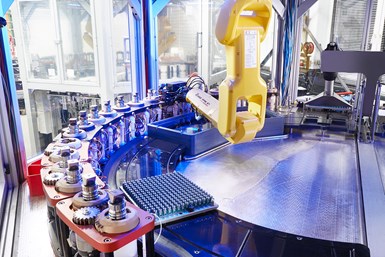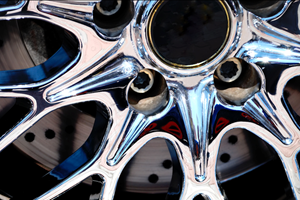
The systems are designed to be highly flexible and can be installed as linear or circular configurations.
Photo Credit: HOLZAPFEL GROUP
The Holzapfel Group (Sinn, Germany) has developed a new high-speed plating process that is designed for meeting customer-specific component plating requirements in a fully automatic, closed galvanic system.
The coatings are designed to be adapted to suit the respective component and deposited with high precision, within narrow tolerances and with exceptional reproducibility.
Quality plating with item-specific anodes
The electroplating process utilizes item-specific anodes or reactor cells that are adapted to each individual component. The constant process parameters are designed to ensure highly reproducible plating results, that are, an exceptionally uniform, exactly repeatable coating thickness distribution and therefore high-quality surface finishes.
The process parameters are continuously monitored to maintain identical conditions. The thickness of the coating can be specifically controlled, for example, to enable different areas of a single component to be plated with layers of varying thicknesses.
Tool concepts adapted from the stamping industry
Alongside adaptations in process technology and the anode system, the Holzapfel Group also adapted ideas from the metal stamping industry and modified them when developing its system concepts. In doing so, Holzapfel placed emphasis on quick-change tools, a robotic transport solution and integrated a workpiece carrier for each stage in the production process (washing, coating, fine cleaning and camera inspection) in its system. The tools can also be pre-set and retracted outside of the system.
Fast and high-speed plating
Conventional barrel and rack plating methods enable larger numbers of components to be processed per cycle. However, the Holzapfel Group's technology is stated to be significantly faster to compensate for the added time and effort involved in individually plating each part and therefore could achieve a comparable level of productivity. The parts are plated in small, closed cells. It is designed to make it possible to achieve higher current densities than in conventional plating processes, resulting in shorter plating times.
Single metals such as chromium can be deposited at high speed in most cases. Coating times of 10-15 seconds can be achieved with the appropriate layer thickness; the time per unit depends on the number of cells being used. When processing co-depositions, or alloys such as zinc-nickel, electroplating cannot be accelerated to quite the same extent. With chemical processes, the process speed can only be increased to a certain degree. With this technology, reactor cells with high flow rates are used to make the deposition process faster.
High level of automation
The high-speed plating technology is extensively automated and features automatic feeding and discharging. All the processes within the plating system are designed to be automated, from electrolytic degreasing, rinsing and electrolytic etching to plating.
Sustainable technology
Energy consumption for the technology is significantly lower, as the systems are stated to require around 35 percent less electricity to power the rectifier and about 50 percent less for the heating systems, cutting emission levels by around 90 percent. Another eco-friendly factor is the reduced amount of process water stated to require, as efficient recycling results in an 80 percent drop in consumption overall. The encapsulated electroplating system is designed to only require about 25-30 percent of the installation space needed for a conventional system.
Research and development
The Holzapfel Group developed a range of solutions for high-speed plating, using a variety of electrolytic plating processes. The use of various simulation techniques is designed to simplify and facilitate the development of systems and coating processes before series production begins. With two testing facilities, Holzapfel can produce samples and develop processes for new product ranges or adapt the system to suit new conditions and components.
Plants for the US-Market
For the United States, the Holzapfel Group offers hard chrome plating plants for engine valves. The plants get engineered, constructed and produced in Europe. The complete plating plant can be set up in-line, integrated in the production process of the engine valves.
Holzapfel Group | holzapfel-group.com
Related Content
Innovation in Plating on Plastic
Plating on advanced plastics solution offers improved adhesion, temperature resistance and cost savings.
Read MoreSuccessful South African Plater Beating the Odds
Remaining focused on quality and reliability, Team Plating Works stays profitable in a volatile and challenging economy.
Read MoreA Chromium Plating Overview
An overview of decorative and hard chromium electroplating processes.
Read MoreLiquid Chrome Vs. Chromic Acid Flake
Contemplating how to continue offering chromic acid services in an increasingly stringent regulatory world? Liquid chrome products may be the solution you’re looking for.
Read MoreRead Next
Education Bringing Cleaning to Machining
Debuting new speakers and cleaning technology content during this half-day workshop co-located with IMTS 2024.
Read MoreDelivering Increased Benefits to Greenhouse Films
Baystar's Borstar technology is helping customers deliver better, more reliable production methods to greenhouse agriculture.
Read MoreEpisode 45: An Interview with Chandler Mancuso, MacDermid Envio Solutions
Chandler Mancuso, technical director with MacDermid Envio discusses updating your wastewater treatment system and implementing materials recycling solutions to increase efficiencies, control costs and reduce environmental impact.
Read More













.jpg;maxWidth=300;quality=90)













